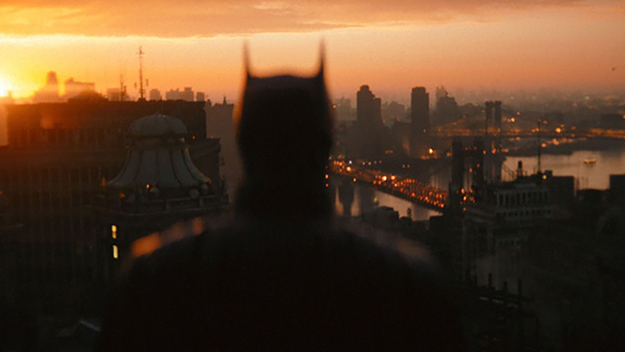Review: The Batman
This article appeared in the March 10, 2022 edition of The Film Comment Letter, our free weekly newsletter featuring original film criticism and writing. Sign up for the Letter here.

The Batman (Matt Reeves, 2022)
When Matt Reeves decided to make an epic paean to Batman as “The World’s Greatest Detective,” he ignored an inconvenient truth: no great American detective film has clocked in at three hours. The Maltese Falcon? One hour 41 minutes. Chinatown? Two and 10. The Batman takes 176 minutes to wrap the rebooting of the franchise around the search for a serial killer who aims to expose something rotten in Gotham City. Reeves can be a brilliant director (especially in his Planet of the Apes films: Dawn of, 2014, and War for, 2017), but this running time is a testament to shallowness run amok.
Despite Reeves’s tip-top casting and his usual combination of disarming earnestness and virtuosity, the movie’s derivative imagination fails to conjure any “vision” for by-now commonplace material. Once again, in a comic-book metropolis, things fall apart, the center cannot hold, and innocence is drowned (in this case, almost literally). All we see slouching toward Gotham is the umpteenth coming of a morose and self-questioning Batman/Bruce Wayne (Robert Pattinson).
Of course, Reeves reintroduces Batman’s supporting cast—stalwart butler Alfred Pennyworth (Andy Serkis) and honest cop James Gordon (Jeffrey Wright)—as well as slippery anti-heroine Selina Kyle/Catwoman (Zoë Kravitz) and a villain “arch” in every sense, Edward Nashton/The Riddler (Paul Dano). Reeves and co-writer Peter Craig stuff the script with dramatic ammo, including the secret life of Mob boss Carmine Falcone (John Turturro), but it goes off with the force of a cap pistol.
The Batman starts with the brutal assassination of Gotham’s mayor and climaxes with the killer’s league of copycats putting a new mayor and all her citizens in peril. Reeves and Craig pattern the bad guy’s M.O. on the Zodiac Killer’s coded messages, the Jigsaw Killer’s torture ploys in Saw, and (naturally) the Riddler’s brainteasers. Reeves aims for a cataclysmic saga of urban entropy, but this kind of plotting, dependent on mirthless, sadistic little jokes, moves like a game of “Mother May I” stuck on baby steps.
Reeves hasn’t forgotten everything he’s learned about good filmmaking: he establishes a rapt audiovisual perspective that holds us moment to moment even if it evaporates from memory in a Gotham minute. Reeves knows how to get us peering through binoculars and leaded windows with a feathery subjective camera and picking among layers of artificial light to find the most ominous threats in the city’s sulfur-streaked shadows. (Greig Fraser did the ace cinematography.) When Wayne (clothes: Robert De Niro in Taxi Driver; makeup and hair: Conrad Veidt in The Cabinet of Dr. Caligari) selects a gang of youthful thugs for punishment by his alter ego, their creepy face-paint recalls the Baseball Furies in that genuine comic-book urban apocalypse, The Warriors (92 minutes).
In this film, Wayne has created Batman recently enough for street thugs to ask who or what he is. Batman answers “I’m vengeance”—a line that can seem fierce and vivid in a comic or cartoon but comes off as pompous and abstract in a live-action spectacle that strains to be Gotham Confidential (L.A. Confidential, 138 minutes).
In 1965, the satirist/cartoonist/author/playwright Jules Feiffer, in his ebullient study, The Great Comic Book Heroes, characterized the Golden Age comics he read (and drew) in his youth as unrepentant “junk,” explaining, “Junk, like the drunk at the wedding, can get away with doing or saying anything because, by its very appearance, it is already in disgrace. It has no one’s respect to lose; no image to endanger. Its values are the least middle class of all the mass media. That’s why it is needed so.”
Fifty-seven years later, comics get collected into “graphic novels” (instead of 25-cent “80 Page Giants”), universities award PhDs in “comics studies,” and comic-book movies form the commercial bedrock of mainstream American filmmaking. The Batman, sad to say, is a very respectable movie. Its moods, violence, and superficially rebellious attitudes—including Catwoman’s snipes at “white privileged assholes”—fall well within industry standards. Its Tinker-Toy construction precludes spontaneity or anarchy. It isn’t as oppressive and pretentious as Christopher Nolan’s Dark Knight films or Todd Phillips’s Joker, but The Batman also has none of the wild highs of the Tim Burton movies. In a couple of droll touches, Serkis’s intense Alfred cracks a critical code and Colin Farrell’s Oswald Cobblepot/Penguin—the Rodney Dangerfield of crime—corrects Batman’s reading of a clue. But the story’s payoffs are too pat to be called “revelations.”
Reeves conceives Bruce Wayne as such a monomaniacal mope that Pattinson, engaged and charismatic though he is, can barely crack an… expression. It’s fun to watch Kravitz’s stripped-wire Catwoman spark to Pattinson’s angsty Batman (her kicky feline fighting style is something to see), but their romance has no room to grow in this detective story. Why couldn’t Wayne’s long-lasting depression over the killing of his parents (and here, their own involvement in a murder) generate a sardonic sense of humor? Maybe one fine day we’ll get a Bruce Wayne/Batman who can face off with the Joker or the Riddler and blithely remark, like George Sanders’s Addison DeWitt, “We all have abnormalities in common.” (All About Eve, 138 minutes.)
Michael Sragow is a Film Comment contributing editor, wrote Victor Fleming: An American Movie Master (Pantheon, 2008), edited two volumes of James Agee’s prose for the Library of America in 2005, and wrote and co-produced the 2019 documentary Image Makers: The Adventures of America’s Pioneer Cinematographers.







